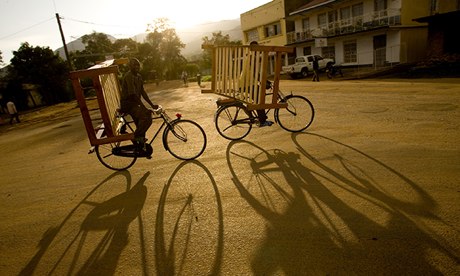First aid: a simple yet radical response to Africa's rising road deaths?
700 people are killed every day on Africa's roads. Compulsory first aid training for new drivers would dramatically cut deaths

First aid training for all is a simple - but ambitious - solution to reducing traffic fatalities on Africa's roads. Photograph: Antonio Zazueta Olmos
The number of deaths resulting from road accidents in Africa is on the rise. The continent currently has the worst death rate for road accidents in the world – almost 250% worse than Europe – with over 151 people killed per 10,000 vehicles in Uganda alone.
Road accidents are predicted to become the biggest killer of children between the ages of five and 15 in sub-Saharan Africa by 2015, outstripping malaria and HIV. We can shift this worrying trend and reduce the impact of road traffic accidents in developing countries in several ways.
First aid
First aid is a crucial part of saving lives, in all stages of life and in every section of society. If we are to decrease the loss of human life – as well as the devastating social, psychological and economic impact road traffic injury has on society in general – access to first aid training must be given appropriate attention and resources and should be an integral part of a wider development approach.
More than half of deaths from road traffic accidents occur in the first few minutes after the crash. It can take just four minutes for a blocked airway to be fatal. As it takes much longer than this for emergency services to arrive – if at all in some countries – immediate care from first-aid-trained bystanders can save lives.
A study conducted in Iraq by the Scandinavian Journal of Trauma, Resuscitation and Emergency Medicine found that the mortality rate from injuries sustained in traffic accidents is significantly lower when first aid techniques are applied at the earliest opportunity.
We need to open the debate around making first aid training obligatory for all new drivers in Africa if we are to reduce the unacceptable death toll on the continent's roads. If it is compulsory to take a test to prove you can drive a car, then why is it not compulsory to take one to prove you can deal with the consequences of an accident?
Stronger laws
In Ghana, around 16,000 people are killed or seriously injured in road traffic accidents every year. In response to thisnew drivers are now obliged by law to undergo a first aid course before they can receive their driving licence. However, these laws have not gone far enough, as there are no provisions in place for those who refuse the training. This is where we need a wider alliance of partners to put pressure on the government to strengthen enforcement.
The Uganda Red Cross, like their Ghanaian counterparts, are using their influence to help create laws that could save some of the 3,000 people killed on the country's roads every year.
However enforcement alone will not suffice.We must encourage people to believe that compulsory first aid only takes a few hours and could save their life, the life of a loved one or the life of a complete stranger. It should be regarded as a social responsibility as much as an obligation.
In Uganda, voluntary first aid is taught to 2,000 drivers, schoolchildren and workers annually, and first aid posts are positioned in notorious danger-zones throughout the country. In Ghana more than 85,000 divers have been trained since 2011.
First aid as part of a wider development strategy
Along with a focus on mitigating the impact of road traffic accidents and promoting first aid training, development groups and governments must recognise that improving road safety in communities needs work on many other levels.
The main causes of traffic accidents are often also problems plaguing many parts of modern society, including alcohol and drug abuse, and lack of knowledge and information.
Governments, businesses and civil societies have long worked together to help prevent traffic accidents from occurring, notably through the Global Road Safety Partnership. We must now work together to ensure first aid is widely integrated into a development strategy that tackles the root causes of road accidents as well as mitigating their impact. Ubiquitous first aid will increase people's chances of survival when prevention cannot help them.
First aid awareness is lacking in many vulnerable communities, where even a basic understanding of how to treat an injury or keep someone alive would have a profoundly positive impact. First aid saves lives and should be available to everyone, everywhere.
Alasan Senghore is director of the Africa Zone at the International Federation of Red Cross and Red Crescent Societies. Follow@AlSenghore on Twitter.

Comments
Post a Comment